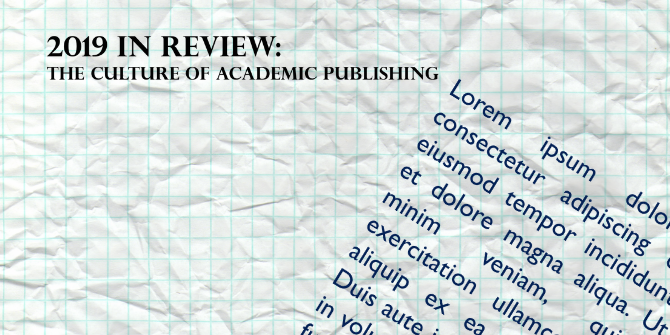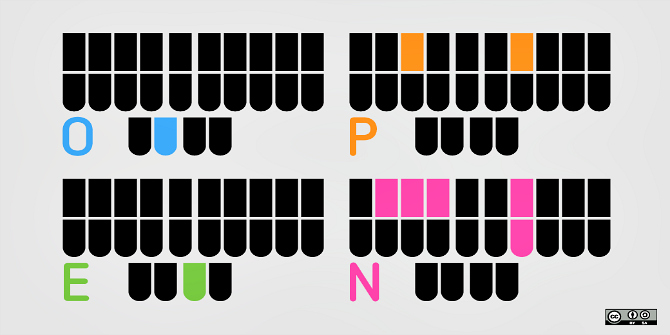
 The peer review process has been subjected to a steady stream of criticism in recent years. This has driven certain innovations, from revealing the content of the process post-publication, to crowdsourcing initiatives. Patrick Riechert and Frédéric Dubois introduce a new peer review feature that is currently being piloted on the journal, Internet Policy Review. Authors are invited to submit abstracts for a proposed paper, and will quickly receive two short peer reviews from scholars established in the journal’s community, with the possibility of additional feedback from the crowd. It is hoped this new feature will encourage transdisciplinarity and generational exchange, allow emerging researchers to find their way, and help scholars find one another and develop connections.
The peer review process has been subjected to a steady stream of criticism in recent years. This has driven certain innovations, from revealing the content of the process post-publication, to crowdsourcing initiatives. Patrick Riechert and Frédéric Dubois introduce a new peer review feature that is currently being piloted on the journal, Internet Policy Review. Authors are invited to submit abstracts for a proposed paper, and will quickly receive two short peer reviews from scholars established in the journal’s community, with the possibility of additional feedback from the crowd. It is hoped this new feature will encourage transdisciplinarity and generational exchange, allow emerging researchers to find their way, and help scholars find one another and develop connections.
In recent years, the traditional article process – first writing, then peer review behind closed doors, followed by, potentially, publication – has had to withstand a steady stream of criticisms, and undergone many innovations and refinements. Although numerous voices have called out the dominant model as slow, obscure, or disadvantageous to new researchers, peer review itself remains of paramount importance to the academic process. As a result, new developments have included everything from the by now relatively established practice of releasing preprints, to reconfigurations of the process to make it faster and more transparent.
One of the trends is toward recognising the role peer review plays in constituting the nexus between a field’s academic community and its process of knowledge production. For instance, the Journal of Peer Production reveals the entire peer review process to its readership post-publication; other approaches, such as “intelligent crowd review”, look to crowdsource the process itself. These are just two of many new models; clearly one-size-fits-all approaches do not constitute an appropriate replacement. Instead, the relationship between a given scholarly community, a journal, and the production of academic works is heavily contingent on the unique qualities of a particular field.
 Image credit: Typing at 255 WPM shouldn’t cost $4000: Plover, the open source steno system by opensource.com. This work is licensed under a CC BY-SA 2.0 license.
Image credit: Typing at 255 WPM shouldn’t cost $4000: Plover, the open source steno system by opensource.com. This work is licensed under a CC BY-SA 2.0 license.
Open source ethos for academia
In fact, we felt that our field of internet policy would benefit from an optional, early, open, and low-threshold peer review. In this vein, Internet Policy Review used a pilot grant from the European Commission (OpenAIRE FP7 Post-Grant Open Access Pilot) to develop Open Abstracts, a new journal feature that applies the open source “release early, release often” philosophy to academia. Part of the journal’s website, it allows anyone to submit (topical) abstracts for a proposed or conjectured academic item such as an article, paper, conference talk, or any other project. All levels of scholars are encouraged to use the feature; from an undergraduate student writing a final paper for a seminar, to a long-term study undertaken at an established institution.
Within ten days of posting the abstract along with a small statement as to its purpose, the author receives two short peer reviews from scholars established in the journal’s community. Insignias attached to their profiles and usernames draw on the existing journal database to describe their relationship to the journal – whether they have written articles for it, acted as peer reviewers, or are part of the editorial board. Other parties – here referred to as “the crowd” – are also welcome to provide their reviews throughout the process. The author of the abstract can then make use of this feedback process in the project’s formative stages, gaining valuable insight, visibility, and perhaps even direct support. Additionally, it may provide a networking element, both in the sense of exchange with experts in the field and getting a foot in the door with the journal community.
A few general thoughts guided us in creating Open Abstracts. Firstly, we wanted to expand the journal as a space in which scholars can find each other and develop connections. Since journals already function as important nodes in academic communities, it makes sense to use their established infrastructures and audiences to further benefit scholars. Second, this space should encourage transdisciplinarity and generational exchange, important qualities in any field, but especially our relatively new and growing field of internet research. Third, we particularly wanted to help emerging researchers find their way, providing them with resources and guidance at an early stage. Fourth, by lowering the effort investment necessary for peer review, we hope to encourage scholars to “rapidly prototype” ideas, benefitting the field as a whole.
Peer review wanted
We recently launched a “public beta” of this feature to test the functionality and gather feedback before shifting into full operation around September. Researchers in the field are encouraged to join, and parties interested in the process should feel free to follow along and contact us. While the model that we designed for our particular field probably works best in in the social sciences or humanities, we are always excited to learn from all corners of the open access universe.
In that vein, we are also planning to give our work back to the community. This was an area in which we benefited from our choice of Drupal as a journal platform, as the core functionality comes together by combining common modules. Once we officially launch the feature, we will share the relevant resources and information so that other journals can easily offer similar features and build on our work.
Note: This article gives the views of the authors, and not the position of the LSE Impact Blog, nor of the London School of Economics. Please review our comments policy if you have any concerns on posting a comment below.
About the authors
Patrick Riechert is a student assistant for the Internet Policy Review, an open access journal published by the Alexander von Humboldt Institut für Internet und Gesellschaft. He is also working for his MA in Political Science at the Freie Universität Berlin after graduating with a BA in Political Science from Macalester College.
Frédéric Dubois is the managing editor of the Internet Policy Review, an open access, fast track and peer reviewed journal on internet regulation published by the Humboldt Institute for Internet and Society, in cooperation with CREATe (Glasgow) and CNRS-ISCC (Paris). Frédéric is a PhD candidate at the Film University Babelsberg. He did a Master in communications at Université du Québec and a Bachelor of Commerce at McGill University, both in Montreal. He worked as a journalist, among other for the Association for Progressive Communications. He co-edited two books about media and journalism: EXTRACTION! (2007) and Autonomous Media (2005). In his other life, Frédéric works as an interactive documentary author and producer.








Seems like a light version of registered reports.